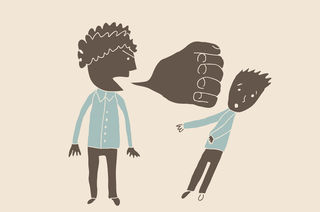Narcissism
“I Know You Are, But What Am I?”
How narcissists deflect embarrassing truths—and how to cope with their antics.
Posted June 2, 2019 Reviewed by Devon Frye

Narcissistic people are compelled to project an image of superiority and flawlessness. They do so to disguise a profound emptiness within.
Anything that touches that emptiness—losing, feeling humiliated, making mistakes, being viewed as illegitimate—can shake narcissists to their foundation, sparking intense fear or rage.
Sometimes that rage is fiery, and they offload their feelings by rejecting, humiliating, or gaslighting others. Other times the rage is icy, and they stonewall, sulk, or deprive.
Sam Vaknin, a self-admitted narcissist who writes about the topic, said that when he feels insulted or deprived of attention, the experience feels like “watching oneself die” or “disintegrating into molecules.”
In essence, having Narcissistic Personality Disorder or a narcissistic style is akin to a tire with a hole, always leaking air. The air is self-esteem. Lacking a sense of self and unable to provide esteem from within, narcissists clutch at success, fame, attention, wealth, beauty, power, and status to feel worthy and whole. Yet these prove fleeting; the tire still leaks.
To compensate, narcissists live in a state of near-constant readiness to defend, deflect, or hide perceived weaknesses. At a moment’s notice, they can summon an array of jaw-dropping tactics to devalue, undermine, and inflict pain on those around them.
Like the Teflon facade of the children’s game “I know you are, but what am I?” the narcissists’ campaign of self-protection is reflected in mirror-image defense mechanisms:
- Fearing themselves to be illegitimate, they de-legitimize others.
- Feeling empty, they covet attention and block others from getting it.
- Feeling flawed or inferior, they act larger than life.
- Feeling shame, they cannot apologize or admit mistakes.
- Feeling ignored or dismissed, they act out and demand attention.
- Feeling wrong, they act beyond reproach.
- Feeling trapped, they distract, attack, or stonewall.
- Feeling rejected or like a failure, they do anything to win.
- Feeling humiliated or weak, they seek to undermine others through labeling, minimizing, or dehumanizing.
Deep down, narcissists abhor the recognition that they, like all humans, can be imperfect, make mistakes, have doubts, and feel lonely. To a narcissist, admitting any of these qualities would be signs of illegitimacy or inferiority. That, they cannot abide.
Narcissists also tend to feel deeply unsettled by facts of life that, while most of us may not like them, we come to accept: We all have limits; we can’t always get what we want; there will always be someone wealthier or more attractive; and, ultimately, death awaits each of us. Rather than look inward and attempt to come to grips with these unsettling realities, narcissists focus outward, seeking from others what they cannot supply for themselves.

The narcissistic people in your life likely want you to downplay your needs and desires, make decisions that aren't necessarily best for you, and ignore your heart, intuition, and soul. Narcissists try to convince you to forego your natural, healthy relationship with yourself—your very birthright—and focus on the narcissist. For narcissists, your relationship with them is all about them, because their lives are all about them.
Knowing these tendencies of people with narcissism, you can recognize their game, have compassion for their pain, and protect yourself from their manipulations. The following reminders can help:
- Not all that glitters is gold. Behind the flashy or self-assured facade, narcissists tend to be deeply insecure. When puzzled by a narcissist’s behavior, ask yourself: “What might they be hiding?” or “What insecurity is being triggered in them?”
- It’s not personal. Narcissists will attack anything and anyone they feel is a threat. It is more instinctive than deliberate.
- You don’t have to play their game. Narcissists don’t seek equality and reciprocity in their relationships; they seek to win. Transparency, authenticity, empathy, and noble aims tend to be foreign to narcissists, especially when their image feels threatened. By honoring yourself, having compassion, speaking your truth, and having high-minded goals, you choose a path for which narcissists have few effective countermeasures. They are left to resort to primitive defenses in the face of such authenticity.


